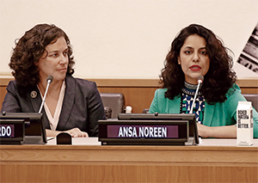By Tamara Laine
NEW YORK — Around the world, human trafficking has reached horrific new heights. Fueled by conflict, poverty, food insecurity and the effects of climate change, traffickers are finding new opportunities to prey on those who are searching for safety.
“It seems trafficking is increasing instead of diminishing,” says Sister Gabriella Bottani, international coordinator of Talitha Kum, an organization of nuns who are working to end human trafficking.
Pope Francis, who has made combating human trafficking a priority, recently acknowledged the impact of Talitha Kum at an exhibit in Rome.
“His words were able to mobilize many people inside of the church and giving us as religious sisters wider support,” Sister Gabriella says.
Asylum seekers who are fleeing violence in their home countries or seeking financial security are at risk of becoming victims of forced labor, sexual exploitation, or blood or organ trafficking. The International Organisation for Migration (IOM) found that 70 percent of migrants traveling from Africa to Europe have been victims of human trafficking.
Forced Marriage

Forced marriage is one tactic used to deceive the vulnerable. A decade ago, Ansa Noreen never believed she would be asked to speak on the world’s stage at the United Nations.
Noreen is a survivor. She explains that around the world — and especially in the Middle East, Africa and South Asia — young girls are being sold into nonconsensual marriages.
“So as soon as a girl reaches the age where she should be married, they would just force her into marriage,” Noreen says. “They have this whole network, with their agencies working in these developing countries.”
Agencies arrange marriages for girls, seizing on cultural traditions in societies that require women to have a male head of the family, Noreen says.
Sister Gabriella sees the problem in many countries, citing Burkina Faso as an example. There, the nuns are teaching that it is not normal for a 12-year-old girl to marry a man who is 70.
Globally, more than 15 million victims are forced into marriages, while an estimated 24.9 million people are victims of forced labor — a problem businesses must be aware of and confront, advocates say.
Forced Labor
David Schilling — senior program director of the Interfaith Center on Corporate Responsibility’s (ICCR) Human Rights & Resources unit — travels around the world working with shareholders to ensure better business values in corporations.
“Whether it’s in supply chains, whether it’s in the recruitment of workers, whether it’s in the hotel, or the travel and tourism sector,” where he says, “knowingly or unknowingly hotels are utilized for commercial sexual exploitation,” businesses need to be aware of their possible connections to exploitation.
The ICCR has 300 faith-driven members, including Sister Pat Daly, O.P. , who remembers when the nuns first noticed how prevalent trafficking had become globally. “It was actually the sisters who would meet in Rome every three years,” she recalls, “so we started to work and then we started to work with companies.”
It is a harsh reality that some products have been touched by the hands of slave laborers. Supply chains leave everything from groceries, cars and clothes vulnerable to malpractices.
In 2005, a revelation that exploitation was happening in the hospitality industry had ICCR members concerned, Schilling says. Specifically the case involved Marriott in Costa Rica, where children had been exploited by traffickers at the hotel chain.
“We filed a shareholder resolution, which is our right as shareholders that went to the company,” he says. “The whereas clauses identified all the issues around the egregious violations of children’s rights and connected it to Marriott.”
The shareholder resolution worked. Soon after, Marriott developed employee policies to protect children. Now, Marriott aims to train 700,000 employees in partnership with the anti-trafficking organization ECPAT-USA. Carol Smolenski, who is now retired, was the executive director who helped implement that program.
“We met several years ago and now realize that we really needed to work with the travel industry, not because they explicitly support trafficking of children, but because their facilities, their hotels, their airlines, their tours might be a place where children are sexually exploited,” Smolenski says.
Smolenski says it took some convincing, but notes that “all of the big U.S. hotel chains have signed on with us.”
According to Smolenski, progress has been made in raising awareness and passing legislation, but much more needs to be done as technology has led to the exponential growth of human trafficking.
When asked what can be done to completely eradicate this global problem, Sister Gabriella took a deep breath before answering.
“First, there are a lot of laws but they need to be implemented; second thing, let us follow the money,” she says.
It is easy to reach traffickers and recruiters, she explains, but those are the little fish. Governments and prosecutors must be willing to go after those who are behind the operations and who are really making the money. “I’m not sure we are willing to do that,” she says.
Finally, Sister Gabriella says that “we must be willing to tackle the root causes of trafficking because we have to continue to work with the survivors. They are suffering and there is a huge need and we need to support them, but if we are unable to change the causes, it will be very, very difficult to reduce trafficking.”
Related: How to Spot a Human Trafficking Victim
—
If you suspect someone to be a victim of human trafficking or may have identified a potential trafficker, use these resources to anonymously report your
findings:
National Human Trafficking Hotline
CALL 1-888-373-7888
TEXT 233733
TTY (Hearing Impaired) 711
CHAT
www.humantraffickinghotline.org/chat
REPORT
www humantraffickinghotline.org/report-trafficking
Laine is a Senior Reporter for Currents News.
